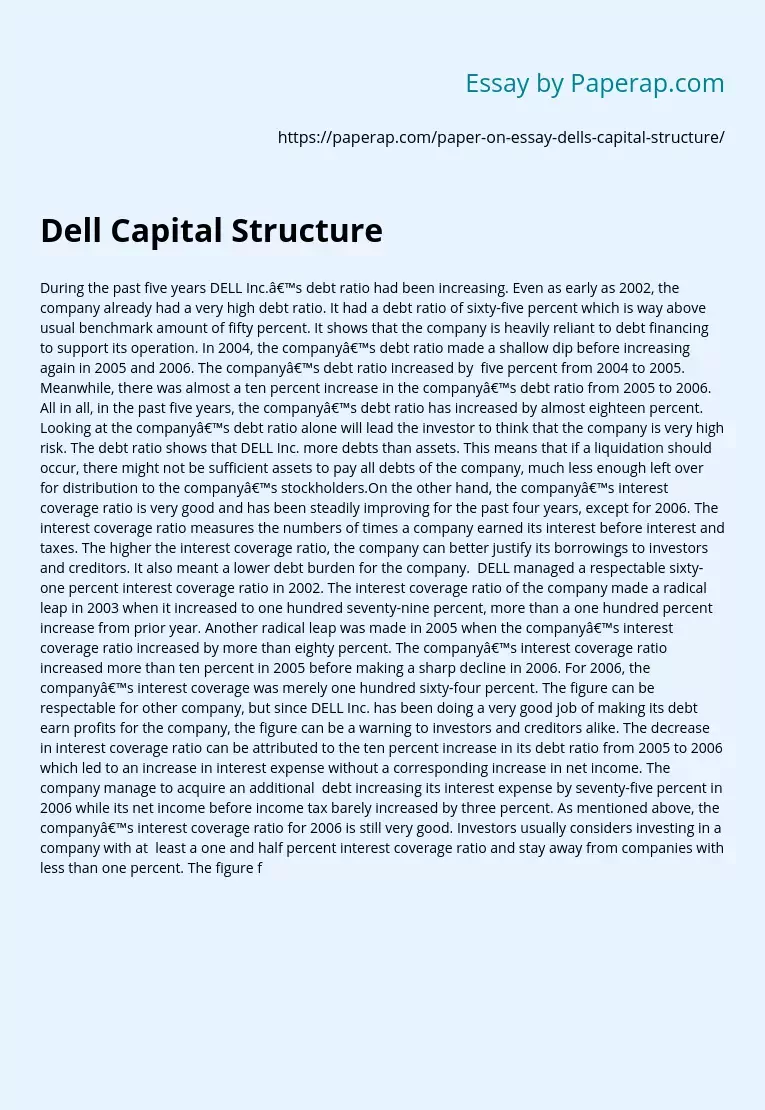Dell INC’s Share of Debt Increased
During the past five years DELL Inc.’s debt ratio had been increasing. Even as early as 2002, the company already had a very high debt ratio. It had a debt ratio of sixty-five percent which is way above usual benchmark amount of fifty percent. It shows that the company is heavily reliant to debt financing to support its operation. In 2004, the company’s debt ratio made a shallow dip before increasing again in 2005 and 2006. The company’s debt ratio increased by five percent from 2004 to 2005.
Meanwhile, there was almost a ten percent increase in the company’s debt ratio from 2005 to 2006. All in all, in the past five years, the company’s debt ratio has increased by almost eighteen percent. Looking at the company’s debt ratio alone will lead the investor to think that the company is very high risk. The debt ratio shows that DELL Inc. more debts than assets.
This means that if a liquidation should occur, there might not be sufficient assets to pay all debts of the company, much less enough left over for distribution to the company’s stockholders.
On the other hand, the company’s interest coverage ratio is very good and has been steadily improving for the past four years, except for 2006. The interest coverage ratio measures the numbers of times a company earned its interest before interest and taxes. The higher the interest coverage ratio, the company can better justify its borrowings to investors and creditors. It also meant a lower debt burden for the company.
DELL managed a respectable sixty-one percent interest coverage ratio in 2002.
The interest coverage ratio of the company made a radical leap in 2003 when it increased to one hundred seventy-nine percent, more than a one hundred percent increase from prior year. Another radical leap was made in 2005 when the company’s interest coverage ratio increased by more than eighty percent. The company’s interest coverage ratio increased more than ten percent in 2005 before making a sharp decline in 2006. For 2006, the company’s interest coverage was merely one hundred sixty-four percent.
The figure can be respectable for other company, but since DELL Inc. has been doing a very good job of making its debt earn profits for the company, the figure can be a warning to investors and creditors alike. The decrease in interest coverage ratio can be attributed to the ten percent increase in its debt ratio from 2005 to 2006 which led to an increase in interest expense without a corresponding increase in net income.
The company manage to acquire an additional debt increasing its interest expense by seventy-five percent in 2006 while its net income before income tax barely increased by three percent. As mentioned above, the company’s interest coverage ratio for 2006 is still very good. Investors usually considers investing in a company with at least a one and half percent interest coverage ratio and stay away from companies with less than one percent. The figure for DELL Inc. in 2006 is way beyond these benchmark figures.
Bond ratings are based on the company’s ability to pay interest periodically and the principal amount of the debt when it matures. The January 2005 edition of Business Week reported the increase of DELL Inc.’s credit rating from A- to A. Standard and Poor’s Ratings Services gave the company’s rating a boost due to several factors. These factors include DELL Inc’s improving market position, consistent profitability and continuous product expansion (S;P Boosts Dell’s Rating para. 2).
The analysts also said that DELL’s efficient working capital management and consistent EBITDA margin of nine percent generate strong cash flow for the company (S;P Boosts Dell’s Rating para. 5). A sufficient and consistent cash flow is necessary for the company to make timely interest payments. A strong cash flow means that DELL Inc. is able to pay interest payments on time as well as the principal amount of debt as they come due. The article also praised the company’s outstanding liquidity which gives it flexibility in its cash requirements despite lack of a committed credit facility (S;P Boosts Dell’s Rating para. 6).;
Cited Work
- “S;P Boost DELL’s Credit Ratings.” S;P Ratings News. January 21, 2005.
- Business Week Online. December 13, 2006. ;http://www.businessweek.com/investor/content/jan2005/pi20050121_3300_pi036.htm;
Dell INC’s Share of Debt Increased. (2019, Dec 05). Retrieved from https://paperap.com/paper-on-essay-dells-capital-structure/

